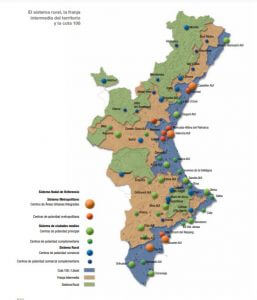How to Set Up a B&B, Camping, or Hotel on Rustic Land in Valencia
Understanding Rustic Land Regulations in Spain
In Spain, rural or rustic land is primarily reserved for agricultural, forestry, or environmental use. This means that commercial and tourism-related developments, such as Bed & Breakfasts (B&B), rural hotels, or campgrounds, are generally not allowed by default. However, there are exceptions, particularly when projects are declared to be of Community Interest (Declaración de Interés Comunitario – DIC).
To establish a hospitality business on rustic land in the Valencian Community, specific regulations and procedures must be followed to change the permitted land use.
Quickest Option: Opening a “Casa Rural”
The most straightforward and expedited route is applying for a Casa Rural license, which may avoid some of the bureaucratic hurdles—especially if the project does not exceed 20% of the existing buildings and the Town Hall grants an exemption.
Step-by-Step Process to Set Up a Hospes Business on Rustic Land
Step 1: Obtaining the DIC (Declaración de Interés Comunitario)
This step is mandatory in most cases unless the land qualifies under the 2019 exemptions (explained below).
1. Pre-Project Design
Prepare an initial project with an architect, detailing the planned business, buildings, access, environmental considerations, etc.
⏱ Estimated time: 1–3 months
2. Town Hall Evaluation
Submit the pre-project to the local Town Hall to assess whether they are willing to change the land’s classification from agricultural to commercial.
⏱ Estimated time: 1–3 months
3. Definitive Project
If initial feedback is positive, a comprehensive final project must be developed including:
Environmental impact studies
Technical infrastructure plans (electricity, water, sanitation)
Health & safety compliance
Engineer and architect certification
⏱ Estimated time: 3–9 months
4. Municipal Approval
Final project approval from the Town Hall.
⏱ Estimated time: 6–12 months
5. Regional Government Approval
Submission to multiple departments:
Tourism
Environment
Industry
Health
⚠️ If even one department rejects the project, the entire application is denied.
⏱ Estimated time: 1–3 years
⏳ Total time for DIC approval: 2–6 years (on average)
Step 2: Applying for the Activity License
Once the DIC is approved, a new business activity license project must be submitted to the Town Hall, tailored specifically to the type of accommodation.
⏱ Estimated time: 1–4 years
Step 3: Registering as a Legal Business
You will need to:
Register as a self-employed worker (autónomo) or a Spanish company.
Apply for a food handling license (if food is served).
Register your business in the Tourism Department.
⏱ Estimated time: 1–6 months
Infrastructure Requirements and Challenges
Depending on the project and land location, authorities may require:
Electricity
If current power lines are insufficient:
You may be required to fund new infrastructure or transformers.
Water Supply
If not connected to mains water:
Costly works or a certified well installation may be required.
Requires geological and legal study + purification system.
Access Roads
You may be asked to pave or upgrade public roads surrounding your property.
Wastewater Treatment
Installation of approved ecological sanitation systems is mandatory.
Additional Obligations
Adequate parking areas
Emergency, fire, and health protection systems
2019 Update: Exemptions to the DIC Requirement (Valencia Only)
As of February 2019, Valencia introduced two major exemptions:
1. Geographic Zoning
Rural Zone: DIC not needed. Requires only notifications to the Town Hall and departments.
Intermediate Zone: DIC not required if the municipality aligns its urban planning with the 2019 Law.
Cota Cien Zone (coastal): DIC still required.
2. Activity-Based Exemptions
DIC is not required for:
Renewable energy installations
Photovoltaic systems < 5 MW
Bioenergy facilities (≥50% own raw material)
Rural tourism businesses that restore architectural heritage
Food industries processing ≥50% own materials (e.g., wineries)

Final Considerations
If the land is urban, not rustic, and the zoning already allows hospitality use, you can skip the DIC and proceed directly to Steps 2 and 3.
You must still comply with Spanish tourism, health, food safety and business registration laws.
Legal Disclaimer
This article is a general informational guide and does not constitute legal or technical advice. Every property and project is unique. Before making any decisions or investments, consult a qualified legal and urban planning expert in Spain to assess your case and guide you through the process.
